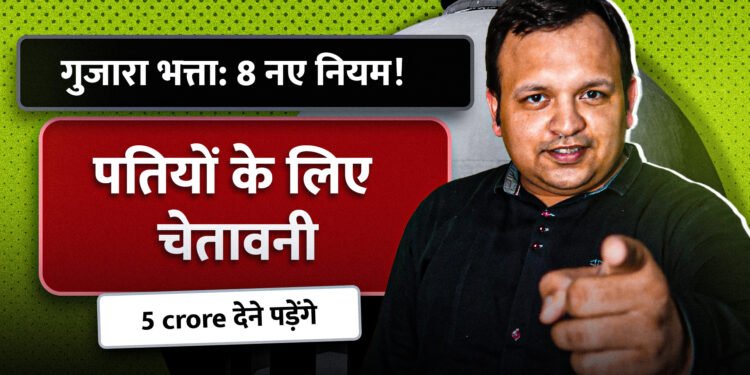Introduction
The Supreme Court’s decision in Parvin Kumar Jain vs Anju Jain (2024) has set a remarkable precedent in determining permanent alimony following the irretrievable breakdown of marriage. This case sheds light on the nuances of Sections 24 and 26 of the Hindu Marriage Act, 1955, emphasizing the equitable treatment of both parties in marital disputes. The Court’s balanced approach to ensuring a fair standard of living for the dependent spouse highlights the significance of understanding maintenance and alimony laws.
To learn more about the topic, read the blog till the end, and if there lies any more doubt, feel free to reach out to us at; https://thelegalshots.com/legal-opinion/
Facts of the Case
- Marriage and Separation:
Parvin Kumar Jain (Appellant) and Anju Jain (Respondent) were married on December 13, 1998, and had a child born on May 28, 2001. However, due to irreconcilable differences, they began living separately in January 2004. The child stayed with the Respondent. - Divorce Petition and Maintenance Claims:
The Appellant filed for divorce on the grounds of cruelty, while the Respondent sought pendente lite maintenance under Section 24 of the Hindu Marriage Act (HMA). - Family Court’s Maintenance Orders:
The Family Court initially awarded Rs. 18,000 per month as maintenance to the Respondent in 2004, which was later increased to Rs. 20,000 per month by the High Court in 2005. - Enhancement Claims and Voluntary Payments:
In 2009, the Respondent sought a significant enhancement in maintenance, requesting Rs. 1,45,000 per month. Although the Appellant voluntarily raised the maintenance to Rs. 65,000 per month by 2015, disputes continued over further enhancements. - Family Court and High Court Decisions:
The Family Court enhanced maintenance significantly in 2018, which was upheld by the Delhi High Court. The Appellant’s challenge regarding jurisdiction under Sections 24 and 26 of the HMA was dismissed, emphasizing that these provisions are independent of divorce proceedings. - Supreme Court Appeal:
The Appellant challenged the High Court’s decision in the Supreme Court, focusing on the quantum of alimony and the jurisdictional aspects of the case.
Judgment and Impact
On 10th December 2024, the Supreme Court directed the Appellant to pay Rs. 5 Crores as permanent alimony to the wife and Rs. 1 Crore for the son’s financial security. The Court acknowledged the irretrievable breakdown of the marriage, emphasizing the need for a dignified standard of living for the wife while avoiding undue financial strain on the husband.
Key Factors Considered:
- Status of the parties
- Financial capacity of the husband
- Reasonable needs of the wife
- Sacrifices made by the dependent spouse
- Cost of litigation
This judgment underscores the importance of balancing equity and fairness while granting permanent alimony, reinforcing the principle of justice in family law.
Legal Provisions Explained
- Section 24 of HMA – Maintenance Pendente Lite and Expenses of Proceedings:
This section empowers courts to grant interim maintenance to a spouse who lacks sufficient income to support themselves during legal proceedings. - Section 26 of HMA – Custody and Maintenance of Minor Children:
This provision allows courts to pass interim and permanent orders concerning the custody, maintenance, and education of minor children during and after matrimonial disputes.
Maintenance and Alimony: Understanding the Difference
- Maintenance: Refers to periodic financial support paid by one spouse to the other during or after the proceedings to cover living expenses. For example, pendente lite maintenance under Section 24 of HMA is temporary and ends with the conclusion of the case.
- Alimony: Refers to a one-time lump-sum payment made after the dissolution of marriage. It provides a long-term financial arrangement for the spouse’s sustenance.
This case highlights the importance of distinguishing between interim maintenance (short-term relief) and permanent alimony (long-term settlement) while adjudicating matrimonial disputes.
Conclusion
The judgment in Parvin Kumar Jain vs Anju Jain highlights the Supreme Court’s progressive stance on marital disputes, ensuring justice and dignity for both parties. It establishes that alimony should not be punitive but a means to provide the dependent spouse with a reasonable standard of living post-divorce. This landmark ruling serves as a guiding principle for future cases involving permanent alimony.
Takeaways for Readers
- The Court considers a variety of factors, including lifestyle, income disparity, and sacrifices made during the marriage, to determine alimony.
- Maintenance and alimony laws under the Hindu Marriage Act aim to balance fairness and equity.
- Understanding your rights under Sections 24 and 26 is crucial in marital disputes.
This case reiterates the significance of financial security and dignity for dependent spouses, marking a milestone in India’s family law jurisprudence.
If doubts still persist, contact our Legal Experts at https://thelegalshots.com/legal-opinion/




